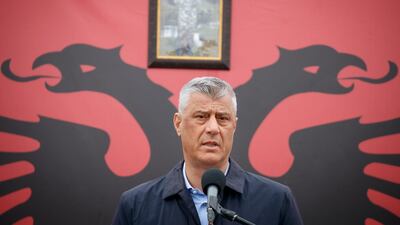A solution to the dispute between Kosovo and Serbia must be a priority for the international community if it wishes to counter the rising anti-Western currents in the region, the president of the Republic of Kosovo Hashim Thaçi said on Friday during a visit to the UK.
Kosovo declared independence from Serbia in 2008, almost a decade after NATO-led forces drove out Serb forces from the territory. Most EU states and the US have formally recognized Kosovo, while Russia and China have sided with Serbia in their refusal to do so.
The European Union is leading efforts to normalise the relations between Pristina and Belgrade, which would pave the way for Kosovo to join the EU and the NATO military alliance. But talks have now reached a deadlock.
“If we fail to reach an agreement, we will continue to live in the past,” Mr Thaçi said in a speech at London’s Chatham House. With populism and extremism on the rise in the old continent, Mr Thaçi said it will be “increasingly difficult” to settle the issue as time goes by.
“We want to get as soon as possible into NATO and the EU,” he added.
US President Donald Trump was described as a friend and ally. Despite having been scornful of the European project and disillusioned with the NATO alliance, Mr Trump has sent two letters to each side in the past two months to demand a resolution to the conflict, according to Mr Thaçi’s account.
The Balkan peninsula is increasingly shaping up to be a geopolitical battleground between Russia and the West. The EU and NATO have recently boosted their influence as a referendum settled the dispute between Macedonia and Greece, frustrating Kremlin’s ambitions.
Mr Thaçi referred to the deal reached between Greece and Macedonia as a “miracle” and expressed hope that the same could happen to his country.
In order to achieve this, the leader of the ruling democratic Party of Kosovo said three conditions must be fulfilled: greater unity on the part of the international community in recognising Kosovo; the absence of pre-conditions to restart political talks; no unilateral actions that violate the political process.
However, Kosovo unilaterally raised taxes on Serbian goods by 10 percent last year, sparking criticism not just from Belgrade but from the European Union.
The move, which was decided upon as Serbia torpedoed Kosovo’s bid to join Interpol, caused the talks to flounder. A possible land swap between Serbia and Kosovo, suggested by EU leaders earlier this year, also did not yield results as it sparked concerns that the border could be redrawn along ethnic lines and reignite festering ethnic animosities.
Mr Thaçi stressed multiple times that Kosovo would remain a multi-ethnic state and a revision of the border along ethnic lines would not be tolerated.
Both Mr Thaçi and his counterpart, Aleksandar Vučić, are hoping to lead their countries into the European Union. Mr Vučić said he would seek a guarantee that his country would join the European Union in 2025 as part of any deal with Kosovo, which many Serbs see Kosovo as their national and religious cradle.
Kosovo is working to fulfil all entry requirements and sees the EU as "the only road forward," but Mr Thaçi said his requests with EU officials in Brussels to speed up the process have so far fallen on deaf ears.
More than 100 countries recognise Kosovo, but some EU member states do not. Among them is Spain, a country that has itself been struggling with separatist movements, which will likely not welcome Mr Thaçi (who joined the Kosovo Liberation Army in 1993) in the EU’s halls of power.

